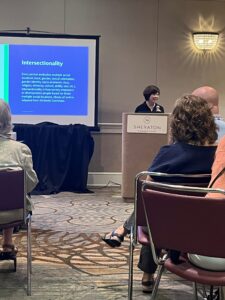
Sue Park-Hur presents during a Follow Jesus ’25 seminar.
During a seminar at Follow Jesus ’25 on Wednesday, Sue Park-Hur, director of Racial/Ethnic Engagement for MC USA and Abby Endashaw, coordinator for Mennonite Central Committee’s Summer Service Program, led a workshop titled, “Deconstructing Patriarchy through the Power Cube.” Have you considered power dynamics related to making decisions about who can have power – or not?This is an important part of dismantling patriarchal systems and empowering women in organizations and institutions.
Because patriarchy can be a difficult subject to talk about, the importance of having a shared understanding of the definition is crucial. Patriarchy is defined as a social structure where men hold disproportionate power and privilege over others, including women, gender minorities, and non-human beings.”
Park-Hur and Endashaw introduced participants to the Power Cube Model and the intersectionality that BIPOC and women can experience, highlighting the multiple social locations individuals embody. The Power Cube concept is a framework used to analyze power dynamics in social and political contexts. There are differing forms of power, such as visible power, hidden power and invisible power. There are also varying spaces of power, which include closed spaces, invited spaces and created spaces. The Power Cube model emphasizes the importance of understanding the interplay between these dimensions to challenge inequalities and create more equitable systems.
One of the forms that power takes is formal power which allows someone to move through all the spaces and levels where power is created and used. They can create spaces of power, and being able to move through various levels and spaces is power. The concept of power is all about having access. The seminar highlighted the question of how we can create more transparency and sharable power and how we can encourage and guide people to navigate the different spaces and levels.
The heart of deconstructing patriarchy with the Power Cube is an attempt to provide a framework to talk about power and how patriarchy takes space and power in our churches. It asks us to consider how we encourage our congregants to exercise their power, and to break away from maintaining our power and to make our spaces more accessible and inclusive.
Park-Hur and Endashaw guided participants through a mini simulation using a made-up case study involving a hiring committee for a new position at a mid-sized church, with recent concerns about limited engagement with social justice issues and declining attendance among younger generations.
Participants role-played committee members, discussing candidates and considering their qualifications and the church’s needs. The simulation reflected a church working through its hiring process and deciding who is chosen.
One of the attendees and participants, Lori Schmidt from Salina Mennonite Church, Salina, Kansas, part of MC USA’s Western District Conference, said, “The seminar was good and very eye-opening. It brought up the question of how we look at the patriarchy.”
Park-Hur summarized the feeling of powerlessness, saying, “who feel like they can’t ask because they often feel like they don’t have power. In fact, they do,” she continued, “That’s the invisible internalization of powerlessness. Awareness of one’s rights and interests is hidden through the adoption of dominating narratives and ideologies.” Sometimes marginalized groups choose to claim their power through creating a space for their voices to be heard.
The seminar ended with a short debrief and time for questions, as well as encouragement to those who feel that they are powerless to step into the power that they do possess.
By Christle Hain.

